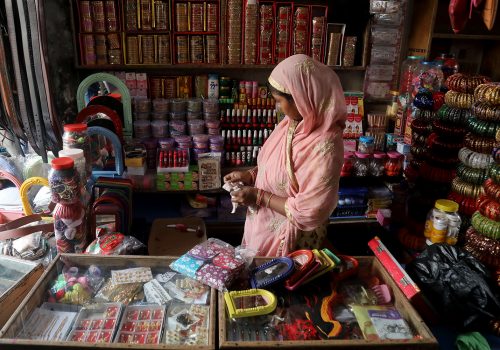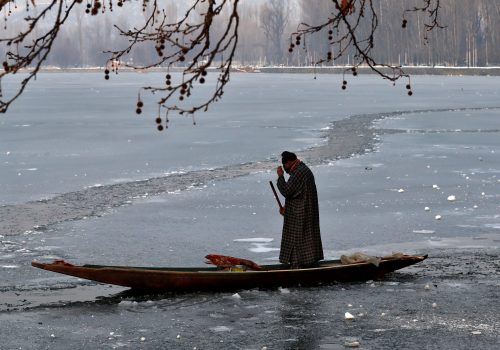The future is here: A guide to the post-COVID world 03/26/2021
Welcome to your guide to where the world is headed during the pandemic era and beyond. Each week, we’ll bring you the latest and most significant expert insights and international news about how coronavirus is reshaping international affairs. To stay updated each week, sign up to the newsletter here.
Let’s take a spin around the globe, in seven minutes or less.
In top stories this week:
- Locking down and easing up: Who is doing what as COVID-19 rates diverge?
- Twist upon twist in a dismal vaccination soap opera
- How about a cruise to nowhere?
- But first…
The big story
This week’s key theme: COVID-19 is nudging cash toward the sidelines
On March 25, 2023 the world will reach a milestone—or at least one country will. In Sweden, cash will be declared useless, and all payments will be digital. That Sweden is the host of this experiment won’t be a surprise to anyone who has tried to use cash there recently: It was the first country in Europe to introduce bank notes, in 1661, and has been at the forefront of banking innovations ever since.
A cashless future has been in the air for a while. Twenty-three years ago in Hong Kong, the Octopus card launched, providing a contactless payment system that could be used in stores as well as on all public transport, including its ferries. This innovation was copied by other cities such as London with its Oyster card—the sea creature link is not coincidence. Since then, though, Oyster has been bypassed by contactless debit cards—on public transport and elsewhere—and companies like Visa and Mastercard reign as the kings of cashlessness.
While there is a much separate discussion about Bitcoin and digital currencies, the cash question is just a matter of practicality. It is all to do with what consumers want, and COVID-19 has moved things along. Last March the World Health Organization told us all to switch to contactless “to slow virus transmission.” Among the evidence it likely used is a 2017 study in which researchers swabbed one-dollar bills to see what was living on them. Among hundreds of species of microorganisms, they found microbes from mouths and DNA from pets and viruses.
Consumers reacted quickly. Singapore’s largest bank DBS said cashless transaction volume nearly doubled in the first three months of 2020, when Asia was in the tight grip of COVID-19. According to Link, the United Kingdom’s biggest cash machine network, ATM use fell by 37 percent in 2020; they were down by 67 percent in April, the first month of lockdown, alone. There is a similar story elsewhere, though some countries are starting from a much higher point—like Spain, a country where 87 percent of all payments were made in cash in 2018.
While there is broad agreement that cash will be squeezed, attempts to abolish it completely will run into fierce opposition, at least in countries where many people are unbanked. A 2017 survey by the Federal Deposit Insurance Corporation (FDIC) found that 6.5 percent of US households did not use banks—with a disproportionate number being people of color. Then there are other groups to consider: the old, who are used to cash; the very young, who like it as a treat; people who expect tips; and perhaps the biggest group, those who want their transactions to be anonymous. Which raises an interesting question: can the world become truly cashless until criminals have all decided that bitcoins are better than dollar bills?
Subscribe to The future is here: A guide to the post-COVID world
Sign up for a weekly roundup of top expert insights and international news about how coronavirus is reshaping international affairs.

The world in brief
Insights from across the planet, in ten bullets or fewer
- Lockdown here, easing there: Germany announced, then canceled, a lockdown over Easter. As elsewhere in continental Europe, COVID-19 rates are rising. Germany had done well and is still on a rolling weekly average of 16.5 case per 100,000 people—almost identical to the United States. But where the US trend is down, Germany’s is sharply up from 9.6 cases at the beginning of March. The United Kingdom, having suffered a massive spike in January, is now down to 8.2 cases. But even though this is half the US rate, it is still in lockdown, with only slow plans to release. Contrast that with the United States, where one of the big cinema chains has just announced it is reopening. This says much about politics, but also about the perceived balance between health and economic damage.
- AstraZeneca stops and starts in Europe: The Oxford-AstraZeneca vaccine is at the heart of the COVAX roll-out to low and middle-income countries. But bad luck, incompetence, and politics dog its distribution. Last week several European countries suspended its roll-out on fears that it caused blood clots, then most of them changed their minds when the European Medical Agency (EMA) said it was safe. But a YouGov survey still found that more than half the Europeans surveyed thought the vaccine was unsafe, a huge drop from the previous month—the poll was carried out during the blood clot affair, though before the EMA had declared it safe.
- And starts and stops in the United States: AstraZeneca may have a good vaccine, but it has not been good at communications. On Monday it announced that results of its US trial showed it was both effective and safe. But later the same day the National Institute of Allergy and Infectious Diseases said the results may have provided an “incomplete view.” AstraZeneca—which is notable in all these affairs by its lack of public statements—has now published updated figures that are similar to the original ones. But the damage in trust may have been done even before a single American has had an AstraZeneca jab.
- And stars in a dismal drama in Europe: On Thursday, an EU leaders’ summit warned the bloc might block vaccine exports. The aim appeared to be to stop AstraZeneca taking its vaccines from a factory in the Netherlands to the United Kingdom. But the mood was calmer than it had been. They were careful not to criticize the United Kingdom—rather, the enemy is AstraZeneca, which they said was not fulfilling its contracts. Once again AstraZeneca has remained tight-lipped, so we are not getting the other side of the story, but what is true is that the EU has not used half the AstraZeneca vaccine it has received. Supply is not the only problem.
- India blocks vaccines exports. COVAX suffered another blow when the Serum Institute of India, the largest supplier to the program, was told by the Indian government to halt exports because the pandemic was surging at home. It makes AstraZeneca vaccines and has been supplying them to African countries.
- COVID-19 creates new alliances. A side effect of the pandemic could be that countries that had little to do with each other find themselves good friends. The Philippines has signed a deal to buy cruise missiles from India and also to get up to 38 million doses of vaccine. The South China Morning Post notes that although the two countries have never been close, they are drawn together by increasing concern about China’s assertiveness.
- To stay or to go? It is hard to keep up with changing news on “vaccine passports” that would allow people to travel in the summer. The travel industry is pressing the EU to get on with launching certificates (the EU does not like calling them passports) that would allow citizens who have been vaccinated, tested negative, or recovered from the disease to travel around the twenty-seven-nation bloc. Southern countries, which are reliant on tourism, are keen; others like France not so much. If the EU says “no,” some member states, like Denmark, may launch their own passports.
- Or try a voyage to nowhere. Even though cruises saw some of the earliest outbreaks—and the US Centers for Disease Control and Prevention warns against them—some operators are offering floating vacations that steer clear of infectious areas. Hong Kong-based Crystal Cruises is selling cruises around the Bahamas—and nowhere else. The case rate in the Bahamas is a third of that in the United States. Singapore started “cruises to nowhere” in November, and Royal Caribbean’s Quantum of the Seas will continue offering them to Singaporean citizens.
- The developing world is a field of discord. The gap in vaccinations between rich and countries is “becoming more grotesque every day,” Tedros Adhanom Ghebreyesus, director-general of the World Health Organization (WHO), said this week, adding that it was giving rich counties a false sense of security. The WHO is not alone in criticizing Big Pharma for its perceived unwillingness to share its intellectual property. The companies have said they were able to develop the vaccines so fast because the traditional patent model made it worthwhile, but stories of manufacturers around the world who want to help but cannot are getting into the news. Meanwhile, the World Bank has been looking at the other part of the story: how ready developing countries are to begin vaccinating their people.
- Message on the mail. Twenty other countries, as well as the United Nations have issued COVID-19 postage stamps, starting with Iran on March 17 last year. The Journal of the American Medical Association (JAMA) has just analyzed them and notes that this high-speed public response makes COVID-19 unique—there were no stamps related to HIV/AIDS until years after its discovery. Some of the stamps have surcharges with the money going to charity—an echo, JAMA says, of the first “disease” stamp—which was for tuberculosis issued by the Danes in 1904. COVID-19 stamps range from a heroic, Soviet-style clinician in France to messages to “wash your hands” from Singaporean cartoon characters.
The inside scoop
Insights from the Atlantic Council



